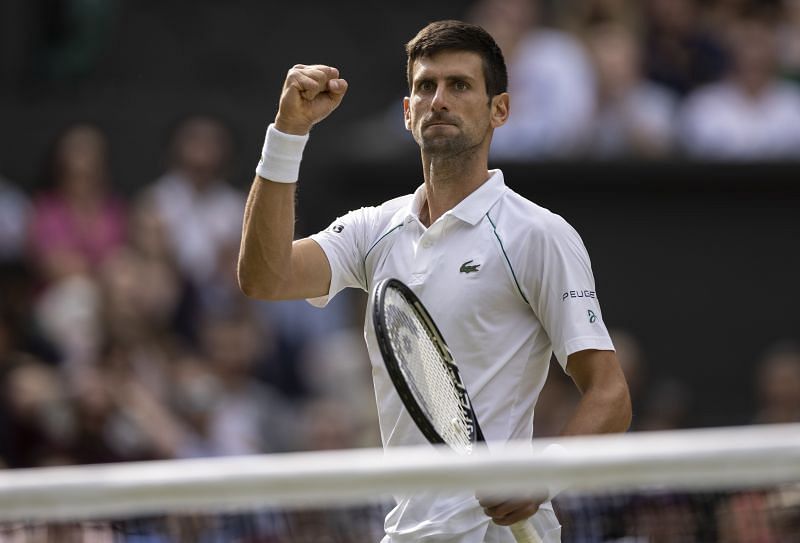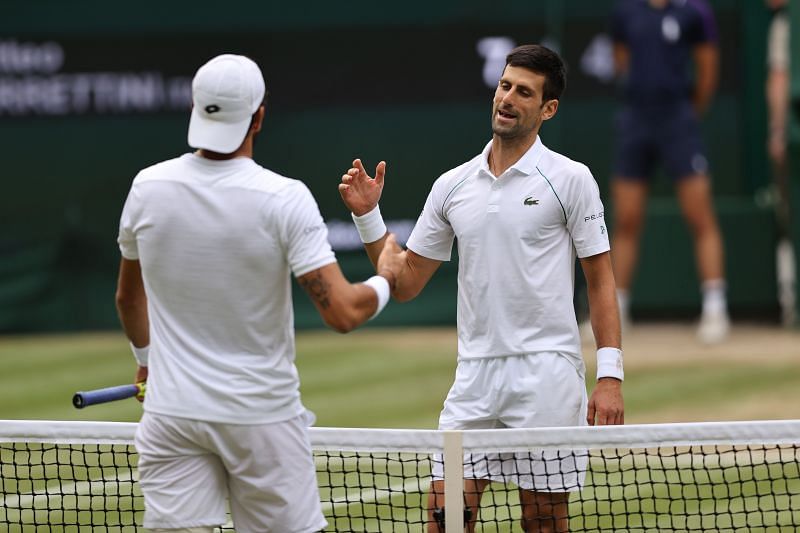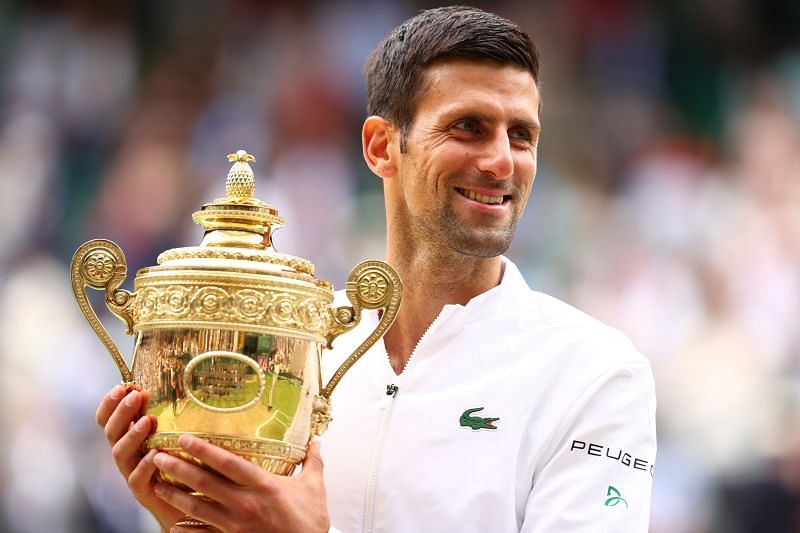
Novak Djokovic is winning Slams without even needing to play his best, but is that really a bad thing?

There was a popular refrain doing the rounds of social media during the first hour or so of the Wimbledon 2021 final, which was the same as that during the first hour or so of the semifinal: that Novak Djokovic was winning despite not playing 'great' tennis.
Denis Shapovalov and Matteo Berrettini were both expected to capitalize on the supposedly sub-par level of the Serb, who was making routine errors and choking on a dime. And when the two failed to do more than take a set (collectively), it led to fans questioning the quality of the players, the match and even the era as a whole.
But forgive me for wondering whether there is any rule prescribing that a player has to produce their absolute best for a win to truly count. Novak Djokovic was admittedly at less than peak level for most of the Wimbledon fortnight, and the stats would reinforce that too. But the most significant takeaway of 2021 so far has been that Djokovic doesn't need his best to win.
The Serb has 20 Grand Slams now, tying the all-time record held by Roger Federer and Rafael Nadal. He also has a positive head-to-head record against them both, has won every Slam and Masters at least twice each, has spent the most weeks ever as World No. 1, and is on the cusp of completing the elusive and coveted Calendar Grand Slam. The GOAT debate already had several points in Djokovic's favor, and yet Wimbledon 2021 has somehow given us another.
Just how good do you have to be if you can beat everyone in your path at the biggest stage of all without ever having to play your A game?
Novak Djokovic forces you to redline your game all the time, as Matteo Berrettini found out the hard way

That Novak Djokovic plays a less spectacular brand of tennis than Roger Federer or Rafael Nadal is almost unanimously accepted as gospel. But it may be possible that that is exactly why he has surpassed them both.
Djokovic has mastered the art of match management in a way that few in history have. For vast portions of his matches it looks like he's just going through the motions, hanging on by the skin of his teeth because the opponent is a supposedly superior shot-maker. But what is not always immediately evident is that Djokovic never lets things get out of hand even when he's playing on autopilot; he never misses the shots that he is supposed to make.
That pattern played out in the Wimbledon final too. The Serb looked fairly ordinary in the first set of the match, even when he was a break up; it seemed almost inevitable that Berrettini would break back at some point and level things. And when the Italian went one step further and took the tiebreaker, questions arose about whether the pressure of the occasion was getting to Djokovic.
It wasn't, of course. Djokovic didn't play much differently at the start of the second set, and yet he transformed the whole complexion of the match in the blink of an eye. The Serb merely tightened up his serve, added a bit of shape to his forehand and got a few more returns back in play, and before we knew it he was two breaks up.
He never trailed in the match again.
How did it all turn around so dramatically, when Djokovic himself had seemingly changed very little? The answer lies in what is essentially the foundation of Djokovic's game: he always forces you to play your best, even if he himself isn't. And doing that for more than a set or two is physically impossible for anyone other than the Big 3.
Berrettini didn't play badly at any point, despite all the criticism you might have seen directed at him on Twitter. He served well for the most part, hid his backhand as well as he could, and unloaded on his forehand at every half-chance he got. But Djokovic kept getting the ball back in play, even off Berrettini's bazooka serves and bullet forehands. He made the Italian hit not one, but two, three, four perfect shots in succession.
How can anyone do that, let alone someone playing their first ever Grand Slam final? For all the criticism of Next Gen and their inability to succeed on the big stage - and I must confess I've been guilty of putting them down too - Djokovic's unshakable defense and consistency mean they have to produce superhuman tennis just to take a set off him.
This may not be a weak era, as many like to believe. Novak Djokovic's brilliance is probably just making the era look weak.
Novak Djokovic - the man who rises to the occasion in every sense of the term

For most of the first three sets Novak Djokovic played largely reactive tennis, allowing Matteo Berrettini to self-destruct out of pressure and frustration. But by the middle of the fourth set a sense of urgency crept into Djokovic's demeanor, almost as though he was determined to not let the match go five sets.
The crowd, vocal as always in support of his opponent, played a role too. They repeatedly cheered well into Djokovic's service motion, presumably to distract him, and when Berrettini stepped up to serve at 3-3, the Serb had a bristly look on his face. That's when he decided to take matters into his own hands, and send out one final statement of intent.
Berrettini landed two big first serves in that game, and those were the only two points he won. Djokovic was all over the Italian on the rest of the points; he hit his returns deep, struck his groundstrokes deeper, and ensured that no matter how big Berrettini hit, he wouldn't be able to get the ball past him.
Berrettini double faulted on break point, but everyone knew he might as well have conceded the game the moment he missed his first serve. Djokovic was not going to be denied in that game; it was his 'abracadabra' moment of the day, and a reminder that he could bring out his best whenever he really wanted to.
So is it really a knock on Novak Djokovic that he won Wimbledon without needing to play 'great' tennis throughout? That 3-3 game showed us that he can turn it on at the flick of a switch, even at the age of 34. And do we really have such short memories that we have forgotten how he produced a peformance for the ages just a month ago to beat Rafael Nadal at Roland Garros?
If there is one thing Novak Djokovic knows, it is how to rise to the occasion. He doesn't put in too much energy trying to produce spectacular tennis every single game and every single set, and that makes him look boring to some. But that could also be the reason why he always has something left in the tank for the big moments.
When there is something on the line, when the stakes are the highest, you can be sure that Djokovic will come at you with everything he's got. And while he may be facing lesser players in Slam finals right now, he has proven in the past that he can also outdo the highest level of opposition that tennis has ever produced.
Roger Federer may be the most 'graceful and elegant' player in the world, as the new Rolex ad put it. And Rafael Nadal may be the most passionate and inspiring athlete ever, with his fiery running forehands ruling the YouTube charts. But neither of them has the numbers that the 'boring' and 'unspectacular' Novak Djokovic now has.
And the Serb has done it all while constantly battling two opponents: the player on the opposite side of the net, and the spectators in the stands.
Djokovic has just kept winning all these years - despite all the hatred from the crowds, despite the presence of two other all-time greats in his era, despite the numerous internal demons he's had to deal with, despite all the odds always being stacked against him. And now we know he can also keep winning despite playing just his B game.
How many more reasons will we get to call him the unambiguous GOAT by the time his career is over?